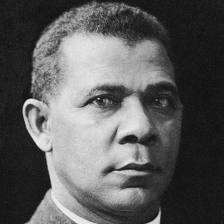
Born into slavery in 1856, Washington had experienced racism his entire life. When emancipated after the Civil War, he became one of the few African Americans to complete school, whereupon he became a teacher.
Believing in practical education, Washington established a Tuskegee Institute in Alabama at the age of twenty-five. Washington believed that Southern racism was so entrenched that to demand immediate social equality would be unproductive. His school aimed to train African Americans in the skills that would help the most.
Tuskegee Institute became a center for agricultural research. The most famous product of Tuskegee was George Washington Carver. Carver concluded that much more productive use could be made of agricultural lands by diversifying crops. He discovered hundreds of new uses for sweet potatoes, pecans, and peanuts. Peanut butter was one such example. Washington saw a future in this new type of agriculture as a means of raising the economic status of African Americans.
In 1895, Washington delivered a speech at the Atlanta Exposition. He declared that African Americans should focus on vocational education. Learning Latin and Greek served no purpose in the day-to-day realities of Southern life.
African Americans should abandon their short-term hopes of social and political equality. Washington argued that when whites saw African Americans contributing as productive members of society, equality would naturally follow.
For those dreaming of a black utopia of freedom, Washington declared, “Cast down your bucket where you are.” Many whites approved of this moderate stance, while African Americans were split. Critics called his speech the Atlanta Compromise and accused Washington of coddling Southern racism.
Still, by 1900, Washington was seen as the leader of the African American community. In 1901, he published his autobiography, Up from Slavery. He was a self-made man and a role model to thousands. In 1906, he was summoned to the White House by President Theodore Roosevelt. This marked the first time in American history that an African American leader received such a prestigious invitation.
Despite his accomplishments, he was challenged within the black community until his death on Nov. 14, 1915. His most outspoken critic was W. E. B. DuBois.








